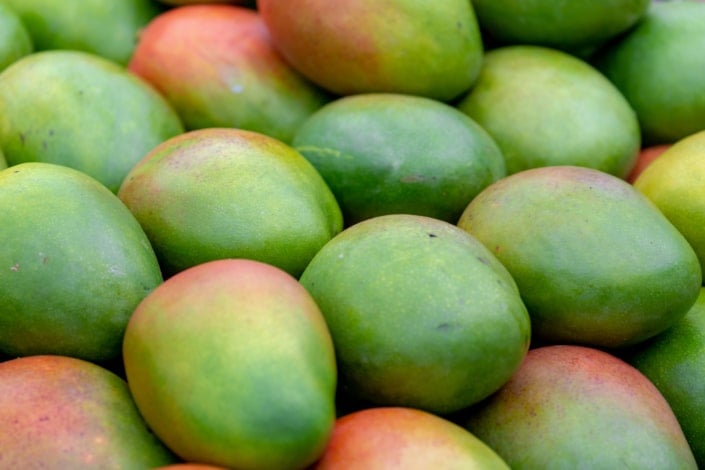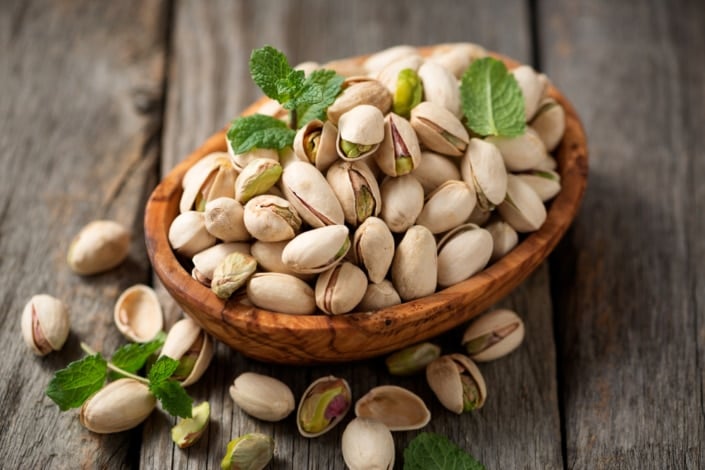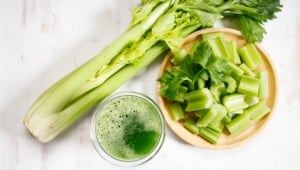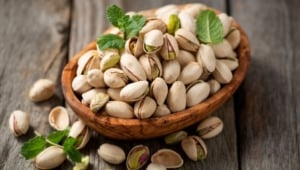11 Pineapple Benefits and 4 Side Effects (+ Nutrition Facts)

Compared to other tropical fruits, pineapples are a real nutritional miracle. They are refreshing, sweet-yet-sour, and juicy to boot. Read on to learn everything there is to know about the benefits of the fruit and its side effects too. In addition, we’ve put together some valuable tips to help you when buying, storing and preparing pineapple.
Not only is pineapple the perfect refreshment in summer, it’s also super healthy and has a lot of benefits for your body.
Interesting Facts about Pineapple

Interesting Facts about Pineapple
The pineapple plant originated in South America, in Paraguay and southern Brazil to be precise. Did you know that nanà means fruit in the Guarani language?
The exterior of the tropical fruit resembles a pine cone, which is why it is called a pineapple.
The Pineapple’s Journey
It was not until the 15th century that the delicious fruit found its way to Europe. This was thanks to the sailors, for whom the vitamin C bomb was a real blessing on long voyages. From Europe, Spanish sailors eventually brought the tropical fruit to India.
Nowadays, pineapples are mainly grown in tropical places, such as Costa Rica, Brazil, the Philippines, Thailand, Indonesia and India.
Varieties of Pineapple

Varieties of Pineapple
There are over 100 different varieties of pineapple in the world. These varieties are classified into five different groups:
- Cayenne:
The fruits weigh up to four kilograms, are cylindrical, orange-yellow and low in fiber. The flesh is pale yellow and aromatic, characterized by higher sweetness, low acidity, and longer shelf life. Smooth Cayenne, Kew, Hilo, Baron Rothschild are included in this group. - Queen:
Leaves are narrow and short and have curved marginal spines. The fruits grow up to 1.3 kg. The flesh is often bright yellow. The fruits are aromatic, sweet and have little fiber. This group includes Natal Queen, Victoria, Alexandra, MacGregor, Z. Queen, Ripley Queen und Fairy Queen. - Spanish:
The leaves are long, narrow, and usually prickly. The fruits have white flesh, reddish-yellow, round and quite fibrous at up to 2.3 kg. Singapore Spanish and Red Spanish belong to this group - Perolera:
Identifiable by the broad long leaves, entire margins, and light green at the base. The fruits are reddish-yellow with a rather strong yellow flesh. Among them are Milagreña, Perolera, Tachirense, Maipure. - Pernambuco:
Marked by long narrow leaves with small straight spines and a wide red stripe. The fruits are pyramidal, greenish-yellow with white to yellowish flesh without fibers. These include Pernambuco, Sugar Loaf, Abacaxi, and Paulista.
Pineapple Nutrition Facts and Calories

Pineapple Nutrition facts and Calories
With only 56 calories per 100 grams, pineapple is the optimal dessert. It is also rich in fiber, fat-free, and contains active ingredients that are good for your health.
And it doesn’t stop there: pineapple also contains bromelain, an enzyme mixture that helps the body to fight inflammation, and can also improve digestion and blood flow. It also facilitates regeneration and tissue repair.
| Nutrition Facts | 100 Grams of Pineapple |
|---|---|
| Calories | 56 kcal |
| Total Fat | 0.1 g |
| Cholesterol | 0 mg |
| Sodium | 1 mg |
| Total Carbohydrates | 13 g |
| Dietary Fiber | 1.4 g |
| Sugars | 9.9 g |
| Protein | 0.5 g |
| Vitamin D | 0 mcg |
| Vitamin C | 20 mg |
| Calcium | 13 mg |
| Iron | 0.3 mg |
| Potassium | 109 mg |
Pineapple Health Benefits

Pineapple Health Benefits
Fresh pineapple is a real superfood: the fruit hardly contains any calories and yet is rich in potassium and vitamin C at the same time.
If you eat 200 grams of pineapple a day, you will cover half of the daily recommended amount of vitamin C. It also provides your body with zinc, manganese, iron and copper.
Strengthens Your Immune System
A strong immune system needs enough vitamin C. Pineapple has significantly more of this than other tropical fruits. The supply of the vitamin also helps the body fight off free radicals as well as absorb iron. In addition, the minerals, vitamins and enzymes found in pineapple can reduce inflammation.
Pineapple Helps You Digest Protein

Pineapple Helps You Digest Protein
Bromelain, an enzyme found in pineapple, plays a key role in the absorption and digestion of proteins. It helps break down the protein molecules in food, enabling the body to better absorb them and making them easier to digest.
Eating pineapple can also help with muscle growth, and so combining pineapple and protein-rich foods is not a bad idea.
Benefits Digestion and Helps with Bowel Conditions
Pineapple has positive effects on digestive diseases thanks to the bromelain it contains. Eating pineapple regularly can help with digestion and make it easier for the body to reap the benefits from the fruit’s nutrients. This has even been proven in numerous studies.
Pineapple Helps Your Body Relax
Unlike other fruits, pineapple contains a lot of magnesium. This ensures that muscle cramps and fatigue are less likely to occur. The same goes for headaches and restlessness.
In addition, the fruit contains a substance that stimulates serotonin production. This can lift your mood and support you during stress.
Pineapple Benefits Your Recovery After Sports

Pineapple Helps Your Body After Sports
Not only does the bromelain found in pineapple improve protein absorption and aid digestion, but it also has an anti-inflammatory effect and prevents muscle soreness. Bromelain is used especially for sports injuries and swelling.
Eating pineapple also has a positive effect when it comes to combating the symptoms of joint inflammation. This also applies to pain relief for people with inflammatory arthritis.
Pineapple Has an Alkalizing Effect
The minerals in the tropical fruit help to level out your body’s acid-base balance. This is a great help especially if you are prone to hyperacidity due to a poor diet, for example.
Pineapple Benefits for Your Skin

Pineapple Benefits for Your Skin
Did you know that you can do more things with fresh pineapple than just eat and drink it? Let us let you in on a real beauty secret: crush the fruit to make a pulp, for example in a blender, and use it as a mask.
Leave it on for about twenty minutes. This will allow you to get the full effect from the fruit and will leave your skin feeling moisturized. It also ensures that any dead skin cells are removed and the cells can renew themselves.
Reduces the Risk of Chronic Disease
In addition to important vitamins, pineapple also contains valuable antioxidants. These help your body manage oxidative stress, which occurs when there are too many free radicals in the body.
This can lead to the development of chronic disease. The antioxidants in the tropical fruit are bound in such a way that they can set a long-lasting defense mechanism in motion within the body.
Pineapple Benefits in Pregnancy

Pineapple Benefits in Pregnancy
There is still the myth going around that eating pineapple during pregnancy can cause miscarriages. However, the enzymes that are believed to be responsible for miscarriage are actually destroyed by the acid in your stomach as soon as you eat the fruit.
So eating pineapple during pregnancy is completely safe as long as you’re not intolerant.
In fact, eating pineapple during pregnancy is quite healthy and pregnant women can keep their vitamin C levels in check whilst supplying their bodies with sufficient water.
Pineapple Helps with Weight Loss

Pineapple Helps in Weight Loss
Pineapple is low in calories (56 calories per 100 grams of pulp), so it’s understandable that you may think the fruit is good for dieting.
At first glance, however, its high carbohydrate and sugar content might convince you otherwise. The large amounts of fructose enter your bloodstream quickly and – if you eat the fruit in large quantities – this can make you feel hungry.
Despite these facts, the pineapple diet – which involved eating pineapple and nothing else – used to be popular and the rumor that the diet was good for losing weight circulated for a long time, with quite a few people being convinced of the positive effects.
Unfortunately, this approach is not particularly successful. Although the diet has a positive effect on the bowel and digestion, it has little effect when it comes to weight loss.
As with other mono diets, only eating one kind of food is not healthy in the long run, as your body will lack the vitamins, minerals and trace elements it needs to build muscle and keep the immune system healthy.
However, if you eat pineapple as a snack or dessert as part of a healthy, balanced diet, it can definitely help you lose weight.
Unfortunately, eating pineapple alone won’t make you slim. At least, there has been no scientific evidence for it so far. While pineapple can’t break down fat, you can use it as an excellent substitute for sweets when dieting.
Sexual Benefits of Pineapple for Men

Sexual Benefits of Pineapple for Men
The bromelain found in pineapple is not only good for digestion, but it can also boost testosterone production. Since testosterone regulates libido, eating pineapple is useful for staying sexually active and boosting your sex life.
Due to the fruit’s high vitamin C content and the presence of vitamin B1, or thiamine, eating pineapple helps to boost a weak libido by stimulating the development of sex hormones.
It also has an energizing effect, meaning that the consumption of pineapple can increase sexual stamina.
Are Pineapples Good for You?

Are Pineapples Good for You?
Considering the vast array of benefits that consuming pineapple can have, we can draw the conclusion that pineapple is good for you.
In addition to strengthening your immune system and helping your digestion, pineapple can improve your skin and even reduce the risk of chronic disease.
Pregnant women benefit from the high vitamin C content and men’s testosterone production gets a boost from the bromelain the fruit contains. Pineapple is also good for weight loss and is able to stimulate the development of sex hormones in women too.
Side Effects of Pineapple

Side Effects of Pineapple
All in all, it can be said that pineapple is good for you, but even though it has a lot of health benefits, there are some side effects that you need to know about.
- Eating pineapples can lead to allergic reactions
If you feel a tingling sensation in your throat or notice your lips becoming swollen after eating pineapple, you may be experiencing an allergic reaction, brought about by the ability pineapple has to soften muscle fiber. It can also trigger latex allergies in some people. - Excessive pineapple consumption can spike blood sugar levels
People who are susceptible to high blood sugar can suffer serious side effects from eating pineapple. The glucose and sucrose sugars pineapple contains can raise the blood sugar levels in your body. If you experience headaches, start feeling thirsty more often, or have the frequent urge to urinate, this indicates that your blood sugar levels might be too high. - Pineapple can cause drug interactions
If you notice chest pain, a bloody nose, chills, fever or dizziness after eating pineapple, this may be due to the fruit interacting with certain medication or drugs.
The bromelain in pineapple can increase the absorption of certain antibiotics, such as amoxicillin and tetracycline, and lead to serious risks. - Tooth decay due to pineapple consumption
Pineapples are highly acidic in nature and may initiate a chemical process in the mouth when consumed. Excess intake of pineapple, coupled with improper oral hygiene, can increase the risk of tooth decay.
Is Pineapple Bad for You?

Is Pineapple Bad for You?
To sum up, there can be some serious side effects of consuming pineapple. If you take certain types of medication or are susceptible to high blood pressure, you shouldn’t eat pineapple too often. You should also refrain from eating too much pineapple if you’re allergic.
Pineapple is not bad for you per se, but it can cause unwanted side effects with some painful symptoms. To prevent this, you should pay attention to your body after you’ve eaten pineapple in order to rule out any side effects or detect them early.
Top Tips on How to Find the Best Pineapple

Top Tips on How to Find the Best Pineapple
Nothing is more annoying than finding out fruit’s not ripe after you’ve already bought it, but when it comes to pineapple, it’s easy to tell whether it’s ripe or not when you’re doing your shopping. First of all, a fresh pineapple smells fruity. However, if the fruit already smells slightly fermented, then it is most likely overripe and won’t taste good.
Unlike other fruits, however, the color of the tropical fruit hardly matters – a green pineapple can also be ripe and is simply green in color because it has broken down less chlorophyll when growing.
You can do some simple tests when making your purchase if you want to be sure, however. Read on to find out more.
Ripeness Test
You can press the center of the fruit with your thumb to test whether it’s ripe or not. A ripe pineapple is ideally somewhat soft. If it yields slightly to pressure, then the fruit is ripe.
Knock Test

How to Find the Best Pineapple
You may already know the knock test from other types of fruit. Knock on the fruit with the palm of your hand. If you hear a hollow sound, this indicates that the fruit has dried out.
However, if the pineapple sounds dull, then it is still juicy inside.
Leaves Test
Another sign of a pineapple’s ripeness is the leaves. These should be dark green and can be pulled from the crown of the pineapple with little effort.
In addition, you can also recognize a ripe pineapple by its flesh. If this is a rich golden yellow, the fruit is ripe. The lighter the inside of a pineapple is, the more likely it is to be unripe. However, if it is very dark, this indicates an overripe fruit. Very soft spots as well as spots are also a bad sign.
Kitchen Tips: How to Prepare Pineapple

How to Prepare Pineapple
To make your pineapple last long in the kitchen and get the most out of it, we have some valuable tips for you below.
How to Cut A Pineapple
You should make sure you cut your pineapple properly to avoid wasting too much flesh. To do this, first cut off the leaves with a sharp knife, then turn the fruit upside down and cut the skin off as thinly as possible.
Start by cutting off the skin from one half of the fruit in strips from top to bottom until the pineapple is completely peeled. Once that’s done, you can quarter the pineapple and easily cut out the core.
How to Store Pineapples Properly

Pineapple Storage
To keep your fruit fresh for as long as possible, you should know the best way to store it. Since pineapple is a tropical fruit, it absolutely does not tolerate the cold in the refrigerator. Temperatures below seven degrees do it no good.
After buying it, you should store it in a bright place and at room temperature. Unlike other fruits, pineapple does not ripen at home.
However, once the fruit is cut, it must be stored in the refrigerator so that it does not spoil. To do this, place the pineapple on an appropriate plate with the cut side facing down. Alternatively, you can cut it into small pieces and store it in an airtight box in the refrigerator or freezer.
How to Make your Pineapple Even Sweeter
Did you buy a fruit that is not sweet enough or still unripe? Then we have the solution: just turn the pineapple upside down, preferably one day before you want to eat it. Since the tropical fruit ripens from the bottom up, it is often sweeter at the bottom. Turning it upside down and giving it the necessary time allows the sugars in the fruit to distribute better, making it sweeter.
Tips for Use: What Are Pineapples Good for?
The vitamin bomb is not only popular in summer – it brings a tropical vibe to our kitchens all year round and can be prepared in a variety of ways.
Whether as a cocktail ingredient, topping, or in hearty dishes, pineapple is a real highlight.
Cooking with Pineapples

Pineapple Salad
One of the most famous dishes with pineapple is probably Hawaiian pizza, but the tropical fruit is also a real taste sensation as part of other meals too.
- Pineapple Curry
In a curry, the tropical fruit really comes into its own. Plus, it’s super easy to prepare and tastes great. It’s best to use tender chicken breast and coconut milk to make your curry and serve it with basmati rice. - On the BBQ
Have you ever barbecued pineapple before? You can simply season it with pepper and some herbs or put it on vegetable skewers together with onions and cherry tomatoes. The tropical fruit develops a special flavor when barbecued and goes great with chicken, shrimp, and tofu. - As a highlight in a Salad
Whether it’s summer or winter, a salad makes a great side dish and is especially refreshing with some pineapple slices. Nuts and cheese go great with the fruit too. - Pineapple Salsa
All it takes is just a few steps to whip up this special fiery dip. Simply mix some mango, jalapeños, bell peppers, tomatoes, and pineapple together with pepper and some garlic, and there you have it, your pineapple salsa is ready to go. - Pineapple Chutney
Pineapple makes for a special addition to your chutney, a creamy, fiery delicacy that’s perfect as a dip. The spicy-yet-fruity sauce can be made with chili, ginger, and lime juice and goes wonderfully with vegetables and meat.
Pineapples in Sweet Dishes

Sweet Pineapple Juice
In addition to hearty dishes, you can, of course, eat pineapple on its own, make a jam or use it in desserts.
- Pineapple in the morning
With its natural sweetness, this tropical fruit enhances smoothies, juices, and breakfast bowls. It also makes a good topping for porridge with coconut milk, for example. - Fruit Salad with Pineapple
Fruit in general is a popular dessert, so it’s no wonder that pineapple is often eaten after meals too. Our tip: top your fruit salad off with some fresh mint to give it a very special aroma. - Fresh Pineapple Juice
Who doesn’t like to start the day off with some fresh juice? In combination with some ginger and orange, you can conjure up an exotic juice in no time at all and nourish your body with plenty of vitamins.
Can Dogs Eat Pineapple?

Can Dogs Eat Pineapple?
Pineapple is exotic, healthy, and popular. Eating it has positive effects not only for humans, but for dogs too. This is only true, however, if you feed your dog fresh pineapple. Canned pineapple is preserved in sugar and due to the processing, there are hardly any vitamins left.
As with other fruit, the same applies: only feed it to your dog in moderation. Fruits like pineapple make for excellent treats and the natural sweetness is an absolute highlight for many dogs.





